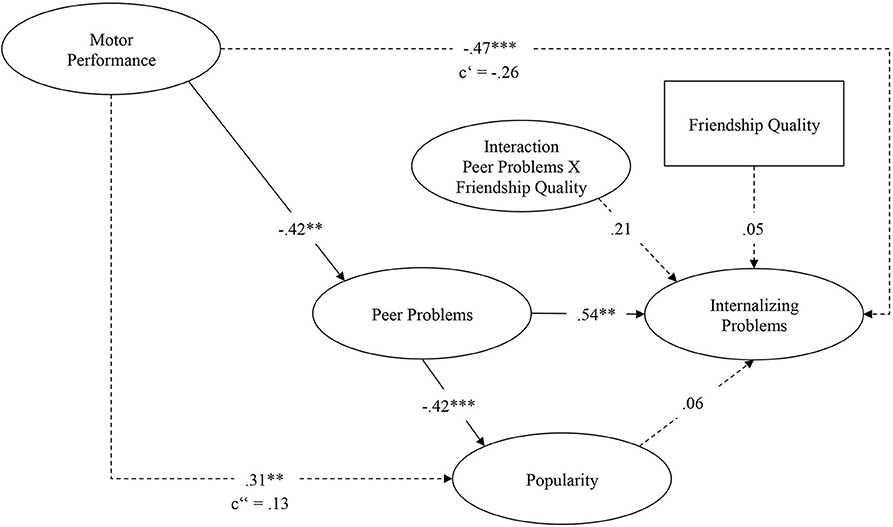Poor Motor Performance – Do Peers Matter? Examining the Role of Peer Relations in the Context of the Environmental Stress Hypothesis
- 1Marie Meierhofer Children's Institute, Associated Institute of the University of Zurich, Zurich, Switzerland
- 2Department of Pre-primary and Lower Primary Level, Zurich University of Teacher Education, Zurich, Switzerland
A Corrigendum on
Poor Motor Performance – Do Peers Matter? Examining the Role of Peer Relations in the Context of the Environmental Stress Hypothesis
by Gasser-Haas, O., Sticca, F., and Wustmann Seiler, C. (2020). Front. Psychol. 11:498. doi: 10.3389/fpsyg.2020.00498
In the original article, there was a mistake in Figure 3 as published. Two numbers in the figure, −0.44 and 0.04, are incorrect. The corrected Figure 3, with the corrected numbers −0.42 and 0.06, appears below.

Figure 3. Standardized results of the structural equation model. Model fit (χ2 = 160.52; df = 147; CFI = 0.97; RMSEA = 0.02; SRMR = 0.05). *p < 0.05; **p < 0.01; ***p < 0.001.
The authors apologize for this error and state that this does not change the scientific conclusions of the article in any way. The original article has been updated.
Keywords: motor performance in daily activities, internalizing problems, peer problems, popularity, friendship quality
Citation: Gasser-Haas O, Sticca F and Wustmann Seiler C (2020) Corrigendum: Poor Motor Performance – Do Peers Matter? Examining the Role of Peer Relations in the Context of the Environmental Stress Hypothesis. Front. Psychol. 11:1206. doi: 10.3389/fpsyg.2020.01206
Received: 01 May 2020; Accepted: 11 May 2020;
Published: 23 June 2020.
Edited and reviewed by: Pietro Avanzini, University of Parma, Italy
Copyright © 2020 Gasser-Haas, Sticca and Wustmann Seiler. This is an open-access article distributed under the terms of the Creative Commons Attribution License (CC BY). The use, distribution or reproduction in other forums is permitted, provided the original author(s) and the copyright owner(s) are credited and that the original publication in this journal is cited, in accordance with accepted academic practice. No use, distribution or reproduction is permitted which does not comply with these terms.
*Correspondence: Olivia Gasser-Haas, Z2Fzc2VyJiN4MDAwNDA7bW1pLmNo
 Olivia Gasser-Haas
Olivia Gasser-Haas Fabio Sticca
Fabio Sticca Corina Wustmann Seiler
Corina Wustmann Seiler